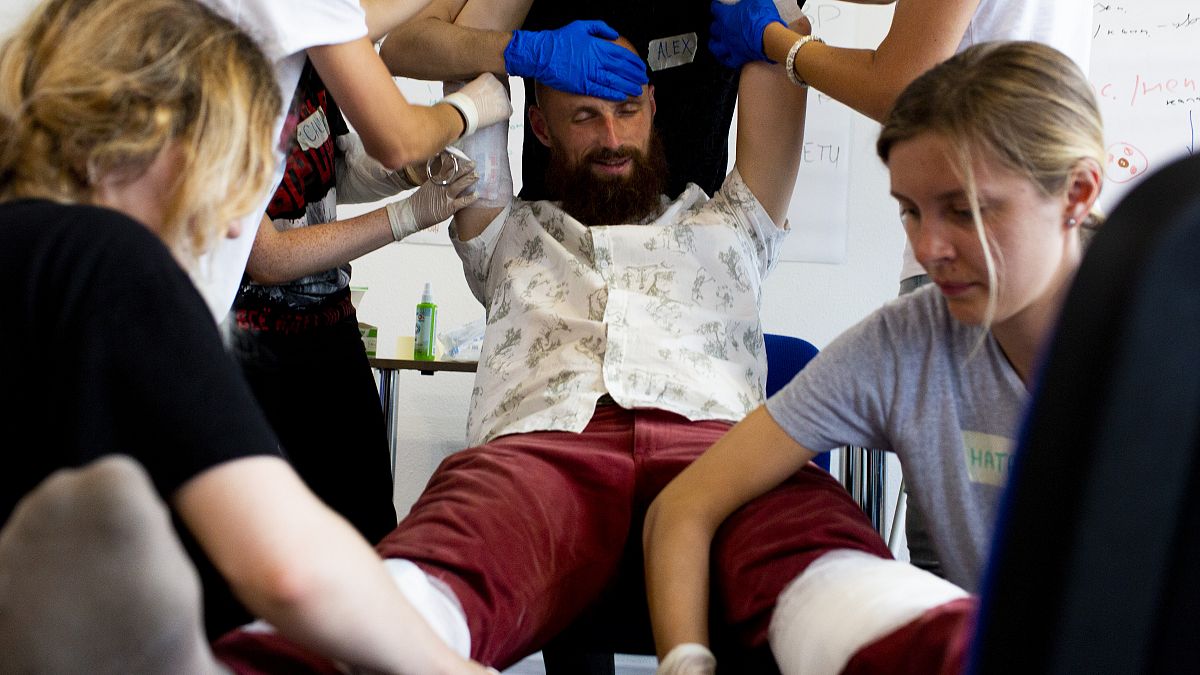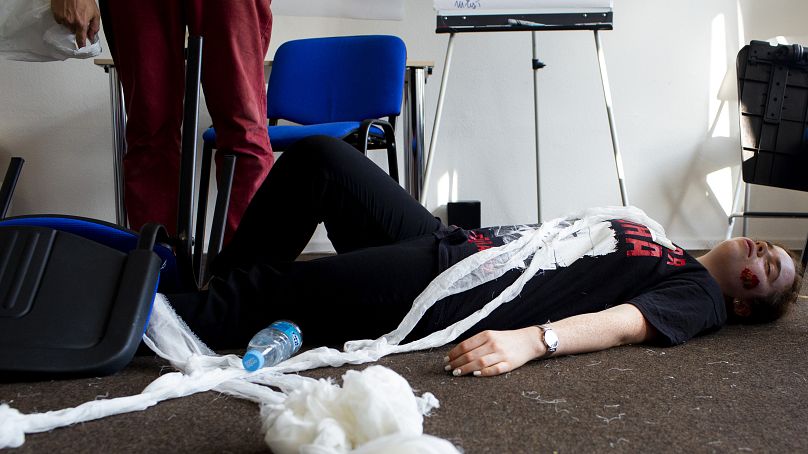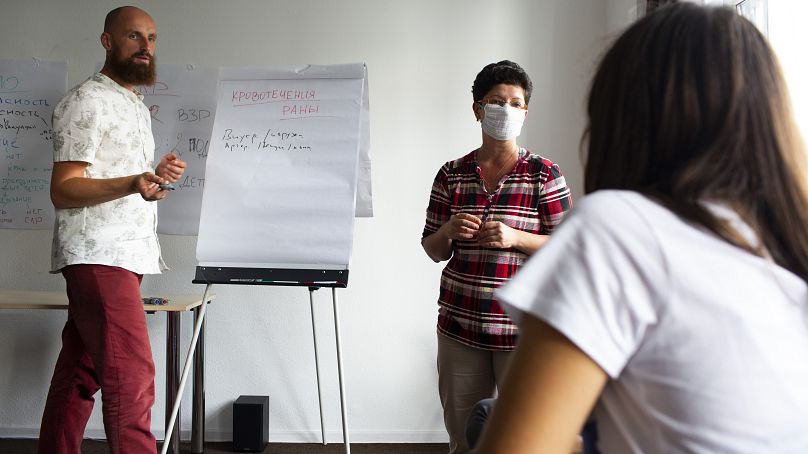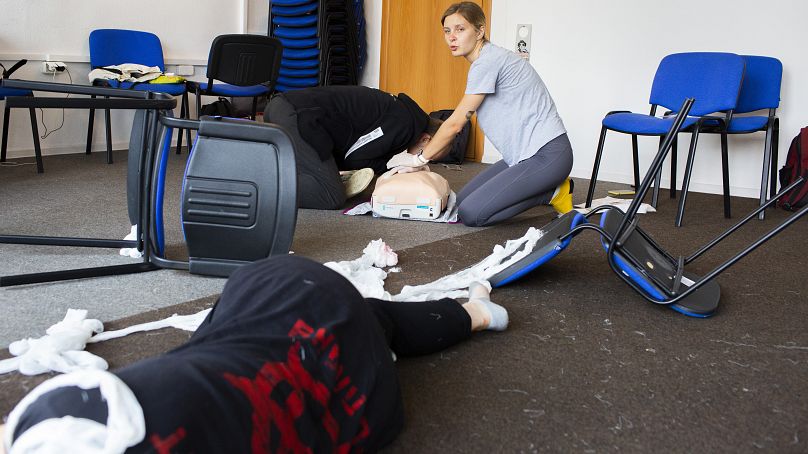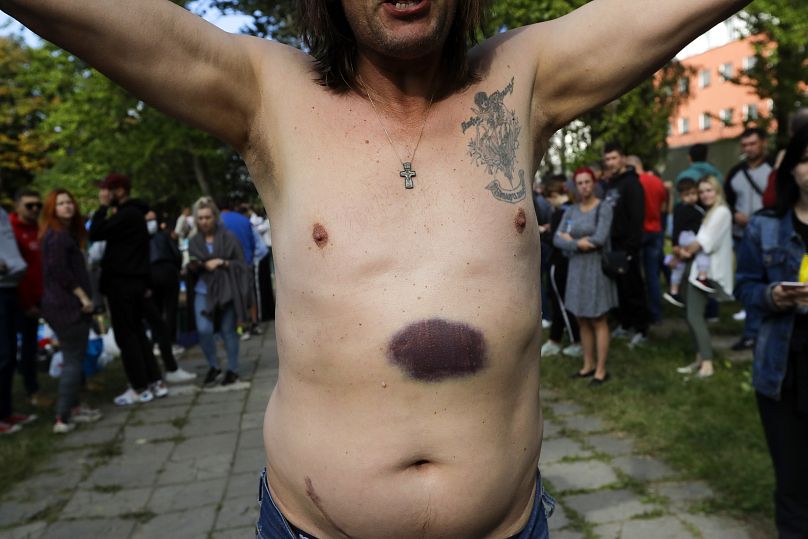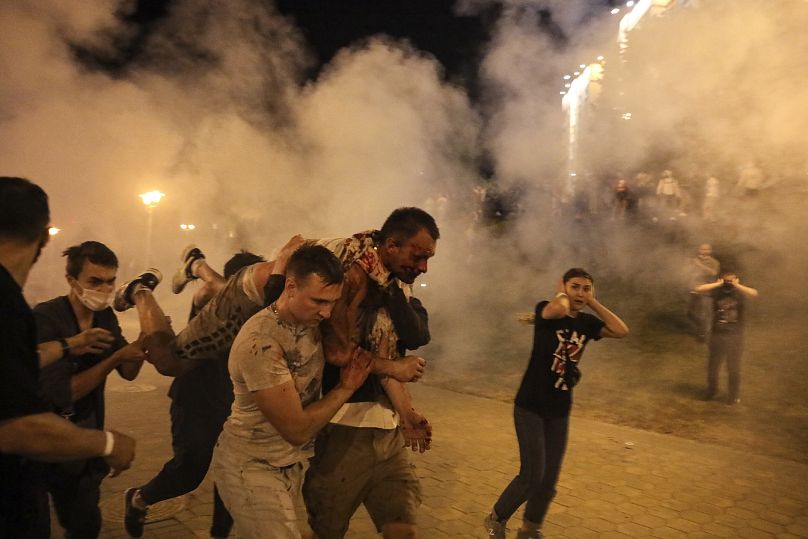As evidence of a crackdown emerges, Belarusians are finding ways to protect themselves in the form of a first aid class. An organisation is providing the training to help those if things take another violent turn.
A woman is severely bleeding from her left leg and another is passed out after being struck on the head. It's a situation that could be all too real in Belarus' protests which took a violent turn last week, with videos purporting to show pro-democracy demonstrators being brutally repressed.
Thousands have been detained and human rights groups have voiced concern over allegations that hundreds of others were beaten or injured.
As evidence of a crackdown emerges, Belarusians are finding ways to protect themselves in the form of first aid classes. An organisation is providing the training to help those if things take another violent turn.
The people attending the training in the Belarusian capital Minsk try to simulate what they would do in real life if they were faced with a similar situation.
They run into the room and try to evaluate the injuries to find out how bad they are before they put a plan into action.
They then put pressure on the wounds and use bandages where needed. The woman bleeding from her leg is in a critical state.
They agree to give her CPR and practice on a dummy. The whistling sound fills the room for every press and the teachers watch them closely. They hold her hand, trying to make contact: “What is your name?” one person asks. But there's no answer.
The training is the first one so far. Seven students are attending the basic first aid training, where they learn how to determine if a person is unconscious, how to perform CPR and how to stop bleeding. The students are evaluated after the mock life or death situation.
“There is a big need for first aid courses in Belarus and 500 people have already signed up for the programme,” Gregory, a 36-year-old paramedic tells Euronews.
He is the program director and he does not want his full name published because the course does not have government permission.
Gregory says that there is a massive need for first aid training after the events in Belarus following the presidential election on the 9th of August.
Thousands took the streets to contest the official result after President Aleksandr Lukashenko, dubbed ‘the last dictator in Europe’, claimed to have received 80 percent of the vote.
Many have questioned the result. Thousands took the streets demanding Lukashenko’s resignation but were met with violence. Around 7,000 were detained, many were beaten, and those released from prison appear to have been subjected to “widespread torture,” according to Amnesty International.
At least two people have lost their lives and many people are missing. The protests have been for the most part peaceful, but Gregory is not confident that it will remain that way.
“We need to do something to help. We do not know how things will be on the streets in the future, but we can help each other. Teach people how to deal with extreme situations,” says Gregory, who points out that the training is apolitical and that he would help anyone in need.
“We hope to expand this training to other large cities around the country,” he says, adding that the training is not only beneficial right now but also good for the country as a whole, because first aid knowledge will always be useful.
A part of a big umbrella
The first aid course is supported by the BY_help, which is lead by activist Andrey Stryzhak. He relocated to Kyiv over fear of being arrested in Belarus.
The group provides the location, bandages, human resources, CPR dummies, and whatever else is needed for the first aid course. However, BY_help is also doing much more than that and has expanded rapidly over the last few weeks.
“We support those who are arrested, beaten or wounded... in Belarus both financially and with support,” Stryzhak tells Euronews.
“Secondly, among other things, we are supporting people who have lost their work for political reasons. We support people who do not know how to get out of their work situation. We help them with shelter and money,” he explains and says that it includes assistance for people on strike.
Since the contested election, hundreds have been striking around the country. But many workers fear they will be fired.
In recent days, it's been reported that the government is threatening workers with job losses. The financial support aims to help them decide, Stryzhak says.
Thirdly, the organisation supports different local initiatives in Belarus, such as Gregory's programme, but also for other issues such as psychological help for the people who have been in prison so that they can better deal with their trauma.
“We are both a rescue team and a place for long-term support. We are an alternative to the government and its medical system because not everyone wants to communicate with the government,” explains Stryzhak, who says that they have collected more than two million dollars (1.6 million euros), mainly from the Belarusian diaspora but also from companies.
'We want to help'
Back at the first aid course, Gregory is telling the seven attendees what to do in specific scenarios. "How do you know if someone is in a critical condition if they are bleeding?" he asks.
One woman suggests calculating how quickly blood is being lost
Gregory smiles and asks how would they know what rapid blood loss looks like? A student suggests if a person's face is turning white, it might indicate it's severe.
The answer makes Gregory chuckle.
“Yes, of course,” he says, “but can you sit and wait for that to happen?”
The students are taught how to work out the severity of injuries in a combination of theory and practice.
They are told that after today they can come back for more in-depth training, so they are ready if things turn violent on the streets again.
Because while there might be much laughter during the training, they all know that the situation in Belarus is serious.
'Like a war zone'
“I do not feel safe at all,” says Marina, a 33-year-old participant who is a stylist and does not want her last name revealed due to fear of government repercussions.
“My friends and I are so scared about what is going on. We are scared even to shop. My country has become like a war zone. I felt it from my home: the shivering, noise, and shots,” she tells Euronews.
“I am here to train myself because the situation is so scary,” she says, fighting back tears.
“Maybe I can go on the street and help if people are shot, but I am not so brave as others. I am glad that there are people braver than me.”
27-year-old Tanya, an artist who doesn't want to giver her full name tells Euronews that some of her friends were arrested and that she felt the need to be able to help people if a similar situation occurs.
She feels she has to help and the first aid program is a great way for her to learn how to do something good on the streets.
“It is so terrible what we have heard from inside the prisons,” she says.
“I am afraid all the time, but I know that I have to do this. We are united now as a society. We are a peaceful nation that wants to help each other. That is why I am here.”
